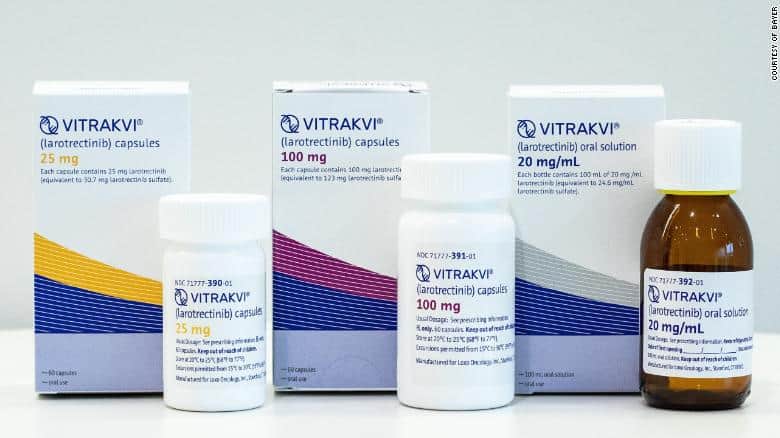
Bayer’s Vitrakvi (larotrectinib) has become the first tumour-agnostic drug in Europe to be approved for the treatment of cancer.
A tumour-agnostic drug targets specific genetic mutations found across a number of different cancer types. In the case of Vitrakvi, the drug targets tumours with a genetic variation known as neurotrophic tyrosine receptor kinase (NTRK).
This mutation is most commonly found in rare cancers affecting children and adults, including salivary tumours, secretory breast cancer and infantile fibrosarcoma, but it is also found in low levels in more common cancers.
The European Commission has given Vitrakvi conditional marketing authorisation in the EU for the treatment of adult and paediatric patients with solid tumours that display a NTRK gene fusion, which occurs in around 1% of all solid tumours.
The drug is only indicated for patients whose cancer is locally advanced, metastatic, or where surgery is likely to result in death and so have no other viable treatment options.
Bayer won approval in the US for Vitrakvi for the treatment of NTRK fusion tumours last November, and also has been approved in Canada and Brazil.
The EU approval is good news for Bayer, as it faces increasing competition from Roche’s rival tumour-agnostic drug Rozlytrek (entrectinib).
Rozlytrek won FDA approval in August, and although Bayer has had a head start over Roche, it could see its progress derailed because of Roche’s willingness to compete on price.
The list price for a month’s supply of Rozlytrek is just over $17,000, compared to almost $33,000 for Vitrakvi. Both drugs have proven to be effective in a small number of patients with the specific NTRK biomarker.
“As the first tumour-agnostic medicine licensed in Europe, Vitrakvi represents a real shift in cancer treatment and creates an opportunity for the UK to demonstrate it is at the forefront of genomic medicine,” said Brendon Gray, medical director at Bayer.
Earlier this year, NHS England’s chief executive Simon Stevens announced plans to fast-track new tumour-agnostic drugs, referencing both Bayer’s Vitrakvi and Roche’s Rozlytrek.
Now that Vitrakvi has received EU approval, Bayer is sure to start negotiating with NICE, which had already begun scoping its appraisal of the drug. It is likely that Bayer will have to make some concession on the price of Vitrakvi, especially if it wants to continue its upper hand over Roche.
NHS England estimates that around 850 patients a year could benefit from these frontrunners, but many thousands more a year are eventually expected to benefit from further tumour agnostic drugs.
Bayer is already working on a follow-up to Vitrakvi, called BAY 2731954, that triggered responses in 45% of patients with TRK-resistance mutations who were resistant or intolerant to a prior TKI inhibitor.




